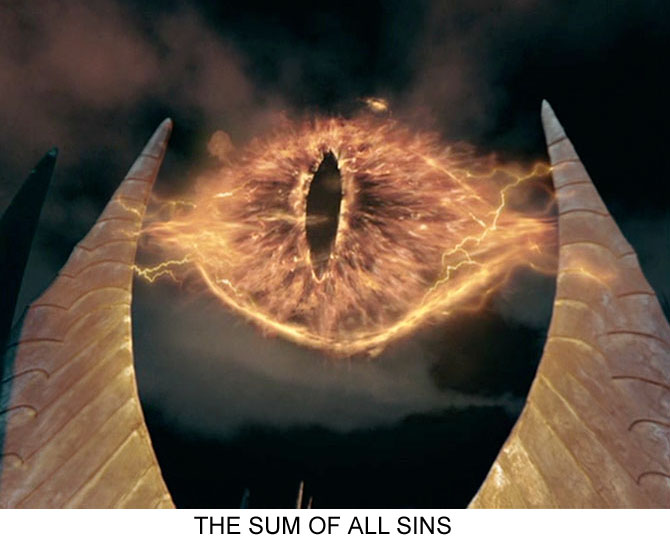 Whose Eye's Light Is Darkness?
In Greek mythology, the Sphinx crouched outside of
Thebes, asking travelors a riddle and killing them
if they failed to answer it, thus exemplifying the
harsh reality that a priceless truth discovered a
moment too late is worthless. Sphinx's evidently
don't have eternity to wait for the right answer,
nor are they particularly eager to have the riddle
unraveled and undone. When Oedipus gave the right
answer, the Sphinx of Thebes killed itself.
Strange, that, and very Sphinxlike, not to mention
puzzling, until you realize that the Sphinx, like
its riddle, cannot endure its unravelment, because
it ceases to be mysterious, inscrutable, enigmatic
or challenging. That is, it ceases to be what a
a Sphinx must be: namely, Sphinxlike. The riddle
unravled is a riddle no more. Riddles, however,
being inherently suicidal, ask to be unraveled, so
the Sphinx killed itself, not Oedipus, for such is
was purpose, and such was its end.
Deadly though Sphinxs can be if veiled, riddles
are not inherently homicidal, then. They are made
to make us think, to think hard, and to understand
that our life and well-being depends on seeing the
the truth in time. Devoid of malice or mercy, the
Sphinx confronts us with a conundrum that can make
us or break us.
That said, consider this riddle: Whose eye's light
is darkness, and how great is that darkness the
further it sees? Here's a hint:
"Society is produced by our wants, government by
our wickedness." --Thomas Paine
Whose Eye's Light Is Darkness?
In Greek mythology, the Sphinx crouched outside of
Thebes, asking travelors a riddle and killing them
if they failed to answer it, thus exemplifying the
harsh reality that a priceless truth discovered a
moment too late is worthless. Sphinx's evidently
don't have eternity to wait for the right answer,
nor are they particularly eager to have the riddle
unraveled and undone. When Oedipus gave the right
answer, the Sphinx of Thebes killed itself.
Strange, that, and very Sphinxlike, not to mention
puzzling, until you realize that the Sphinx, like
its riddle, cannot endure its unravelment, because
it ceases to be mysterious, inscrutable, enigmatic
or challenging. That is, it ceases to be what a
a Sphinx must be: namely, Sphinxlike. The riddle
unravled is a riddle no more. Riddles, however,
being inherently suicidal, ask to be unraveled, so
the Sphinx killed itself, not Oedipus, for such is
was purpose, and such was its end.
Deadly though Sphinxs can be if veiled, riddles
are not inherently homicidal, then. They are made
to make us think, to think hard, and to understand
that our life and well-being depends on seeing the
the truth in time. Devoid of malice or mercy, the
Sphinx confronts us with a conundrum that can make
us or break us.
That said, consider this riddle: Whose eye's light
is darkness, and how great is that darkness the
further it sees? Here's a hint:
"Society is produced by our wants, government by
our wickedness." --Thomas Paine


